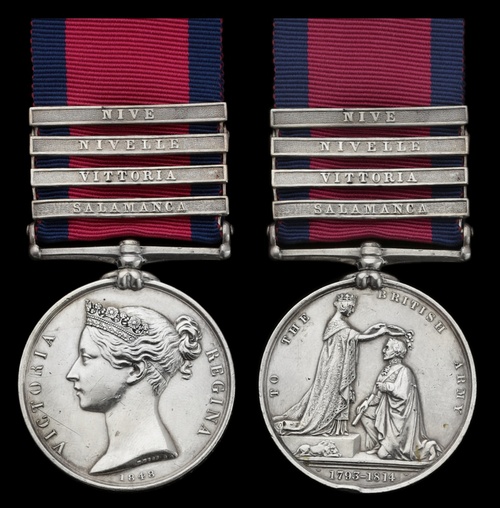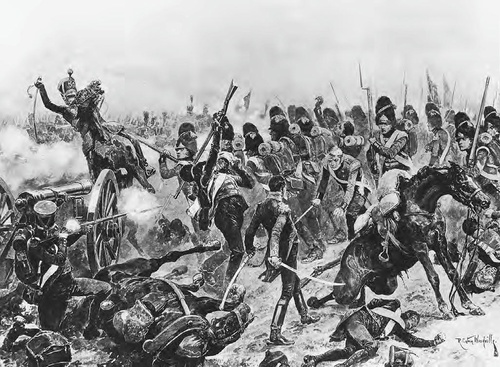Auction: 22003 - Orders, Decorations and Medals
Lot: 12
(x) The fascinating Military General Service Medal awarded to General E. W. Bell, 7th Regiment of Foot (Royal Fusiliers) who, after active service in the Iberian Peninsula and North America, ended his military career as a full General and whose son, Edward William Derrington Bell, was awarded the Victoria Cross for capturing a Russian cannon during the Crimean War
Military General Service 1793-1814, 4 clasps, Salamanca, Vittoria, Nivelle, Nive (E. W. Bell, Lieut 7th Foot.), lightly polished and one minor edge knock to rim, otherwise very fine
Edward Wells Bell, born c.1789, appears to have been commissioned into the 7th Regiment of Foot (Royal Fusiliers) in 1811, likely one of a number of reinforcements for the regiment after their heavy losses at the Battle of Albuhera in May of that year. At the Battle of Salamanca (22 July 1812), the 7th formed part of Lt-Gen Sir Galbraith Lowry Cole's 4th Division, and as such were in the centre of Wellington's line. During the assault to capture the Greater Arapile from the French, the battalions of Cole's command took very heavy casualties and at one point were in great danger from a counter-attack by both infantry and cavalry which came close to breaking the allied line. In turn, Wellington rushed the 1st, 6th and 7th divisions to assist the beleaguered 4th and the battle inexorably swung in favour of the allies. Undoubtedly, Bell would have been in the thick of things. At Vittoria (21 June 1813) the 7th were still part of Cole's command, this time as members of the 2nd 'Fusilier' Brigade in the Right Centre Column which captured the village of Arinez from the French. After further participating in the battles of Nivelle and The Nive respectively, and with the conclusion of the Peninsular War with the final victory at Toulouse, on 14 June 1814 the regiment sailed for home. However, a mere four months later the 7th received orders to embark for North America for service against the forces of the United States in the 'War of 1812'.
Earmarked for the army being formed for operations along the southern coast, the Fusiliers joined Major-General Sir Edward Packenham's force of some 8,000 men (many, like the 7th and Packenham, Peninsular veterans) in preparation for landing at New Orleans. Having defeated American forces at Bladensburg and Baltimore, in addition to consigning Washington to the flames, the British were confident in their ability to do the same further south: however, the subsequent battle between Packenham and Andrew Jackson (8 January 1815) was an absolute disaster for the British - their frontal assaults were repulsed, Packenham himself was killed, and British losses amounted to some 2,000 men against a mere 71 Americans. Fortunately for Bell, the 7th were part of the reserve force under Sir John Lambert and did not participate in the main attack, instead covering those shattered regiments of the British force as they withdrew; despite not taking part in the attack, Bell must have witnessed some terrible sights that day.
After New Orleans, the British went on to have slightly more success in capturing Fort Bowyer, which commanded access to Mobile Bay - however, peace had already been declared and shortly afterward the British withdrew. Bell, still a Lieutenant throughout all his active campaigning, remained in the Army (returning to Europe with the 7th as part of the Army of Occupation in France, 1815 - 1818) and slowly progressed through the ranks being promoted Captain in 1822, Major in 1826, Lieutenant-Colonel in 1830 and full Colonel in 1846. In 1856 he was appointed Lieutenant-Governor of Jamaica, though his tenure only lasted a year - and in December 1859 he was then appointed Colonel of the 66th (Berkshire) Regiment of Foot, which honorary position he held until his death. Made Lieutenant-General in 1860 and full General in 1868, Edward Wells Bell died at Kempsey, Worcestershire on 9 October 1870. His obituary (Illustrated London News, October 22 1870, p.435, refers) makes note of his military career and specifically mentions his four-clasp 'War Medal'.
Having married Mary Anne Chapman the couple went on to have one son, Edward William Derrington Bell, in 1824: young Edward followed his father into the Army and was commissioned into another Fusilier regiment - the famous 23rd Royal Welsh Fusiliers, whom his father's regiment had served alongside in the Peninsular War. Being part of the British Army in the Crimea, on 20 September 1854 Bell performed an act of great gallantry which would result in his award of the newly-instituted Victoria Cross. His citation reads:
'Recommended for his gallantry, more particularly at the Battle of the Alma, where he was the first to seize upon and capture one of the enemy's guns, which was limbered up, and being carried off. He, moreover, succeeded to the command of that gallant Regiment which he brought out of action; all his Senior Officers having been killed or wounded.' (London Gazette, 24 February 1857, p.659, refers).
Undoubtedly such an act - and its reward - would have been a source of great pride to Colonel Bell, who likely remembered much of his own campaigning exploits in Portugal, Spain and North America forty years previously. It is also worth noting that Bell's Medal, with these four clasps and in this combination, appears to be unique to the Regiment.
Subject to 5% tax on Hammer Price in addition to 20% VAT on Buyer’s Premium.
Sold for
£3,500
Starting price
£1200







